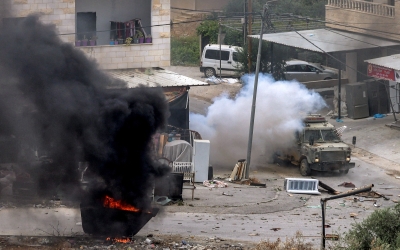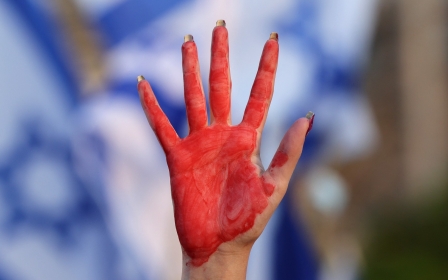US brands Israeli moves to expand West Bank settlements an 'obstacle to peace'

The US State Department said on Sunday that it was “deeply troubled” by Israeli moves aimed at expanding settlement construction in the occupied West Bank.
Washington branded the Israeli move to discuss 4,560 housing units across the occupied West Bank as an "obstacle to peace".
Of those, 1,332 are up for approval, with the remainder going through the preliminary clearance process.
"As has been long-standing policy, the US opposes such unilateral actions that make a two-state solution more difficult to achieve and are an obstacle to peace," the statement continued.
"We call on the government of Israel to fulfil the commitments it made in Aqaba, Jordan and Sharm El Sheikh, Egypt, and return to dialogue aimed at de-escalation," the State Department added.
In February, a meeting in Jordan's Aqaba between Israel and the Palestinian Authority ended in a joint statement outlining an Israeli commitment to suspend discussions on new settlements in the occupied West Bank.
However, following that meeting, Israeli Prime Minister Benjamin Netanyahu said the building of illegal Jewish settlements will continue to go ahead.
The next month, Israeli and Palestinian representatives met alongside US, Jordanian and Egyptian delegations in Egypt's Sharm el-Sheikh and committed to taking steps to reduce tensions.
Israel, in particular, agreed not to advance plans for new settlements for four months and not legalise new outposts for six months.
'We will continue to develop settlements'
The majority of settlement units under discussion now would be located deep in the West Bank. The move would further diminish efforts to create a contiguous and viable Palestinian state.
Escalating the situation are the new powers bestowed by Netanyahu's government on his far-right finance minister, Bezalel Smotrich.
A new resolution gives practically all control over planning approval in the West Bank to Smotrich, who is himself a settler and a fierce proponent of settlement expansion.
The decision, which takes immediate effect, speeds up the process of expanding West Bank settlements and retroactively legalising settlements under Israeli law.
All Israeli settlements beyond the 1967 borders are illegal under international law.
"We will continue to develop the settlement of and strengthen the Israeli hold on the territory," Smotrich said at the weekend.
According to the new resolution, which is based on a 1996 government decision, whereas before there were numerous stages of authorisation from the defence minister, now that has been whittled down to one approval.
A meeting at the defence ministry to discuss new construction works will come just as the four-month moratorium, agreed at the Aqaba and the Sharm el Sheikh meetings, expires.
Before the moratorium was introduced, Israel approved a record number of new settlement homes, at least 10,000, and proposed to legalise at least nine outposts.
Earlier this month, Israel shelved a plan to expand a settlement east of Jerusalem, which, if constructed, would divide the occupied West Bank in two.
The plans for the E1 settlement project, which would see 3,412 housing units built for Jewish settlers on occupied Palestinian lands, would connect the Kfar Adumim and Maale Adumim settlements with occupied East Jerusalem.
The United States and the European Union have long objected to the settlement plan, warning successive Israeli administrations not to move forward with the project.
Middle East Eye propose une couverture et une analyse indépendantes et incomparables du Moyen-Orient, de l’Afrique du Nord et d’autres régions du monde. Pour en savoir plus sur la reprise de ce contenu et les frais qui s’appliquent, veuillez remplir ce formulaire [en anglais]. Pour en savoir plus sur MEE, cliquez ici [en anglais].





